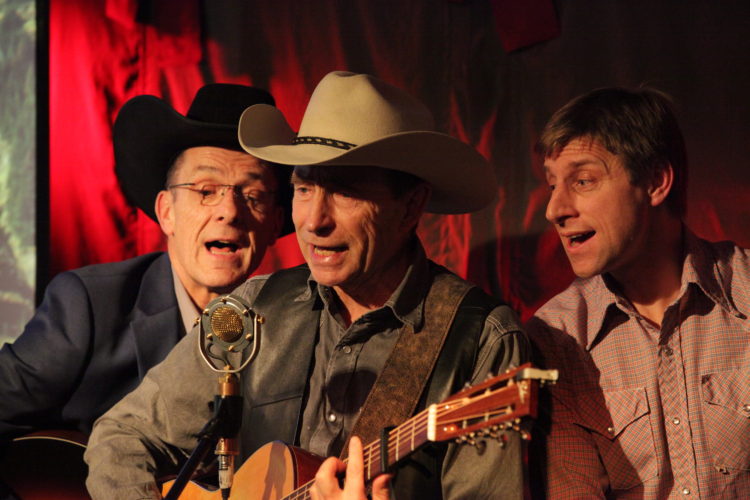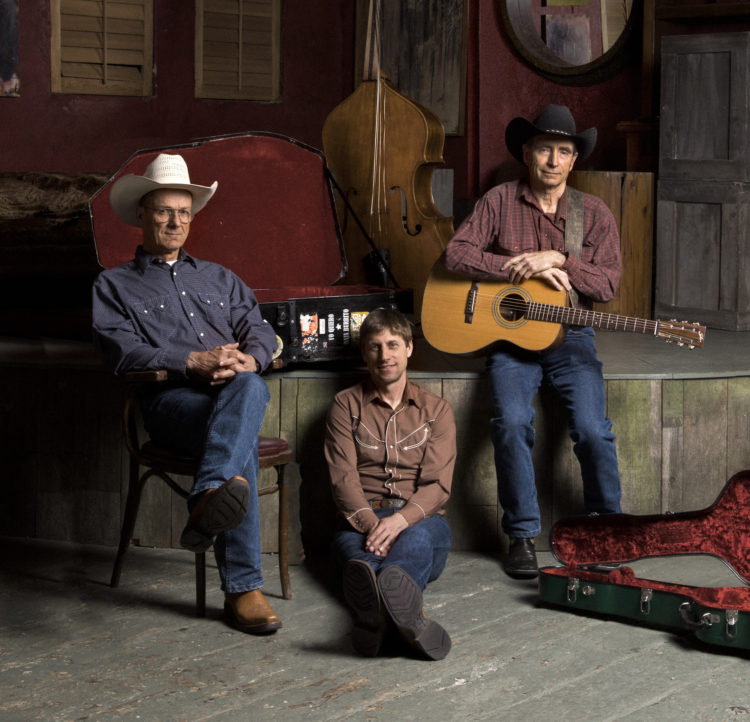
Canada is blessed with a veritable cornucopia of geographically, philosophically, ecumenically, and culturally-based forms of folk music, representing the diversity and variety of the populace, and the voices of both long-time communities as well as newcomers to Canada bringing their own musical melodies, rhythms and voices.
Since 2009, The Wardens have been combining real-life encounters with the sometimes harsh, often majestic and always awe-inspiring nature of Canada’s mountainous Rocky Mountains with a homespun, timeless and evocative musical mode of storytelling to create a unique brand of roots music that engenders images of campfires and cabins as opposed to nightclubs and bright lights.
The trio consists of current and former Parks Canada wardens Brad Bischoff (vocals, lead and rhythm guitar), Scott Ward (vocals/fingerstyle guitar) and Ray Schmidt, who also sings, as well as plays upright bass and mandolin. They were formed a decade ago serendipitously at a park rangers’ event, starting modestly enough providing entertainment at special events and campgrounds.
Their blossoming popularity amongst the general public has led to the release of one EP and two full-length albums, all three critically acclaimed, as well as opportunities to tour throughout western Canada and the U.S., including many festivals where they have opened for the likes of Blue Rodeo, Pharis & Jason Romero as well as legendary western Canadian troubadour Ian Tyson.
The group’s beginnings were humble enough, beginning with Bischoff and Schmidt chatting about music at Schmidt’s first job with Parks Canada as a dispatcher. They bonded over music and would play at season-ending wardens parties, with their audience made up of other wardens, enjoying the music and stories around a campfire. Ward soon joined to make it a trio.
“In 2009 it was the National Park Wardens centennial and there was a big gathering in Banff and all three of us by then had played together at wardens parties and talked about working up a set for the 100th anniversary. So, having that target forced us to discipline ourselves to put a show together. It went really well and after that we realized we had something here: we had stories, we had songs and we’ve got this whole compelling package and if we could just refine it, we may be on to something. And here I am now talking to you 10 years later and we’ve definitely got something,” said Schmidt.
That ‘something’ is a kind of balladeer-inspired western folk music that is in some ways akin to the cowboy songs of the American Wild West, full of tales of wild and wily characters, adventures and misadventures and healthy respect of the beautify and danger of the land, landscape and its wildlife.
“Not all our songs are specifically about our jobs. The music that we do is influenced by the land and experiences that have shaped us as people, and I think that’s true of a lot of folk music. If you listen to country, western, bluegrass and traditional folk music, there are a lot of references to land and landscapes and I think it lends so well to music, and I think that’s why our music, which we call mountain music, or our mountain sound, works really well,” Schmidt explained.
“Because these places evoke feelings and there are great stories to be told that come from working with the land or being influenced by the land. So, broadly, we are representing a culture, a wilderness culture that is Canada. I think people in Canada, we always have this idea that if things go sideways, there’s always this little cabin in the woods that we can retreat to. And we sort of represent that little piece of wilderness that still exists in this country, and the possibility to do that in this country that doesn’t exist anywhere else, and I believe that we’re very lucky to have. That’s what comes out of our shows on the other end is this reverence for the land and these rich stories that come together when you connect people and the land.
“A lot of the songs are from our experiences – our direct experiences. And then we do also have those mythologies and the ballads of those great characters that we have met along the way, or that have shaped the Rocky Mountains and the places we have inhabited. We have essentially inherited this landscape that these stories and characters have shaped for us. We bring to life and preserve some of these great stories that are otherwise lost, that may be stuck in an archive or museum and never really get dusted off. And we can do that in a three to five minute format that really strikes people and still keeps this alive. We also tell these rich stories to help frame the song; that’s a big part of it, the storytelling behind the song, and people love that. We are able to almost create that sense we are all around a campfire, and it’s a very, very intimate experience. I mean, who doesn’t love hearing a good story around a campfire at night.”
The Wardens just wrapped up a whirlwind tour of both large and small communities in British Columbia and Alberta and are now using their spare time to write a record a follow-up album to their most recent release, 2017’s Sleeping Buffalo.
“We’re hoping to release in in the late spring or summer next year. We’re going to be heading into the studio right after this tour for parts of November and December and we’re going to start laying down the first tracks. We have actually been test-driving some of the new songs on tour, which is always fun, because then we can actually see how audiences are responding, which can inform some of the changes we might make to some of the new songs. And it’s also just exciting for us to play some new stuff,” said Schmidt from Rogers Pass, B.C. where he is posted to monitor grizzly bears at Glacier National Park.
Each member of The Wardens could be said to have come from a different generation of warden, bringing their experiences and stories together to create a truly expansive and unique interpretation of the Canadian wilderness. Ward is now retired but spent nearly three decades at numerous postings throughout the rugged interior. Bischoff’s career had seen him work at Banff National Park for close to 40 years, while Schmidt, a native of Waterloo, Ontario, started around the turn of the millennium. Bischoff retired more recently.

“I think that’s what is pretty cool about the evolution of the group. We’re really covering some of the stuff that Scott would have gone through in the 1970s and 1980s, and then Brad in the 1980s and 1990s and now me in the 2000s and the present. I think we have expanded the breadth of material that we can cover storytelling-wise by adding me into the mix as a songwriter, and that’s actually kind of new and special. We’re going to have newer stories because of that. It was mostly just Brad and Scott that were doing the songs but by the last album, I started adding a lot more of my stuff. I feel like now I’ve got this body of experience as a warden that I can now draw upon to create songs,” said Schmidt.
“What people tell us is that what we do is not hokey. It’s very real, it’s very authentic and that’s because it’s about us and what we have seen and heard and even the tall tales are real stories that are part of the environment that we come from. It comes directly from us, and not many people are doing what we do. In a lot of cases we are still very much living the life that park wardens have led for over a hundred years: we are still riding horses out in the back country, we are still spending time living in cabins and seeing free ranging wildlife – this culture, this way of life still exists. I think that is what is also really cool, is that we can talk about the past, we can talk about the present and it’s equally as magical, especially in this day of technology and the internet and stuff.”
Schmidt said it was never in even considered when The Wardens began that they would have an opportunity to be on the same bill as the likes of Ian Tyson and Blue Rodeo.
“It’s mind boggling, really. We were playing with Ian once and he came backstage and just hung out with us. And when you’re huge fans like we are, and you meet a guy like that and you’re talking to him just like a regular guy, it’s a really special thing. We would hope that what we’re doing is a little bit like walking in his footsteps and carrying on, in our small way, the great work that he has done,” he said.
“And it was the same with Blue Rodeo. What a fantastic experience to get to play with them, and then here we were the next week playing in some dingy motel in southern Saskatchewan, the realization hitting us that yes, we may have played with Blue Rodeo, but we were a long ways away from being like Blue Rodeo. Honestly, both experiences are fun for us; it’s just great to be out on the road bringing our music to the people.
“Once we started releasing proper albums and going on tours all over the place it just got us deeper into the music industry which is something we knew nothing about at the time. We were just a bunch of guys riding horses in the back country. We were not that connected on that front but working with producer Leeroy Stagger on our records helped us get into that world and hearing about all these different places to play. And because now that we’ve got a record, it made sense to go and play in in front of people.”
And it’s that interaction that will keep Schmidt, Ward and Bischoff writing, recording and performing their Mountain Music for the foreseeable future, as they believe it is more than just entertaining folks, but educating them and helping illuminate and sometimes forgotten part of Canada’s cultural experience.
“We do the job that we do on behalf of all the people of Canada and the world, and we do our music for the same reasons, in order to maintain these stories, also for all the people. They are not just our stories; these are stories that belong to all Canadians, because we are all connected and all have a responsibility in protecting these places,” Schmidt said.
For more information on The Wardens, visit http://thewardensmusic.com.
- Jim Barber is a veteran award-winning journalist and author based in Napanee, ON, who has been writing about music and musicians for nearly three decades. Besides his journalistic endeavours, he now works as a communications and marketing specialist. Contact him at jimbarberwritingservices@gmail.com.
SHARE THIS POST:
